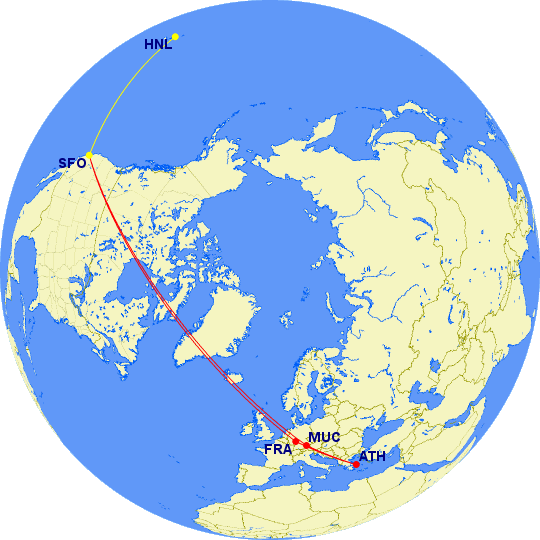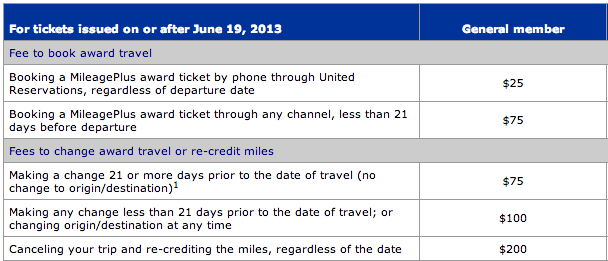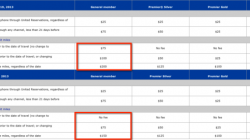In theory, United Airlines doesn’t allow MileagePlus members to place awards on hold during the booking process. (There are workarounds, but it’s always nice when you don’t have to rely on workarounds.) This can make it difficult to construct all the segments necessary for an award ticket. But what’s even more difficult is finding a way to assemble a complex award that spans several weeks and multiple destinations.
Carol recently emailed me with a question about the best strategy for creating a complex award for her family. They plan to fly from San Francisco to Athens, return, and then use a free-one way to get to Maui several months later. (For a refresher, a “free one-way” is a combination of a stopover and an open jaw that lets you add on a free ticket for a future trip. Assuming you don’t use your one free stopover on an award somewhere during your original itinerary, you can place it at your home city.)
Award Availability vs. Change Fees
The challenge Carol faces is that no one in her family has elite status to help offset change fees, and they are concerned about when and how many award seats will become available. Some people believe that the best award availability is when the airline originally loads the flight into its reservations system (usually 330 days out from departure).
Even though it’s possible that some airlines will “always” release two award seats in business class available to the early bird, it’s just as likely that the airline may reserve seats until closer to departure — whether that’s three days before or three months before — since it has no real incentive to release award seats unless it expects them to go unsold. It’s hard to make such predictions as a consumer, and every airline is unique.
So Carol wanted to know: Should she book her tickets early, as soon as the schedule loads for the first segment, and make changes to the reservation each time a new segment becomes available? Or should she wait and try to book it all at once? Or some combination? What kinds of fees would she face?
Round-Trip to Athens
My opinion is that Carol should wait until see sees availability for both her outbound and return flights to Athens, which means checking 330 days from the return journey but less than 330 days for the outbound. Summer is the high season in Europe, yet there are many opportunities to connect along the way from San Francisco, and intra-Europe flights are easy to get. Her main challenge will be the trans-Atlantic portion of her journey, and it’s for this reason that every award search I do begins with exploring overwater availability and then piecing together connecting flights.

Even though Carol would prefer to fly non-stop from from SFO or LAX to connect in FRA or MUC, I’m not too concerned because (1) it will be easier searching for seats in economy class and (2) there are many backup solutions that involve connecting on the East Coast. The primary goal here is to book a round-trip flight in the first place so Carol avoids the change fees associated with modifying a one-way itinerary. Carol could book a one-way outbound first and modify the reservation later to create a round-trip award when she finds return space, but that will require a change fee. And a round-trip itinerary is definitely necessary in her case since only round-trip awards are eligible for a free stopover.
For passengers worried about finding award space and who are just booking a simple round-trip (or an open jaw without the stopover), it’s fine to book two one-way awards. The cost is no different unless you plan to change or cancel the itinerary, in which case two separate awards means two separate fees.
Adding the Free One-Way
Carol’s free one-way to Maui in December will be also be challenging, and there are not many opportunities to choose different connections on the way there like there are when getting to Europe. At the same time, it’s not worth the risk waiting several extra months while award space to Athens disappears just so she can avoid paying any fees at all. Assuming Carol finds a good roundtrip itinerary to Europe. I say book that trip and be thankful. Wait until later to deal with Hawaii.
Without elite status, Carol will have to pay $100 per ticket to change the round-trip itinerary to include a stopover in San Francisco and a free one-way to Hawaii. It’s worth it, I think, for a ticket that can normally cost $200-300 one-way. Update: I was originally looking at the old fee structure when I wrote this post, forgetting that fees for changing origin or destination, even 21+ days before departure, had recently increased from $75 to $100. The post has been corrected.

United’s MileagePlus members used to be able to avoid fees with some changes, but no longer. (Fees are discounted for Silver and Gold members and waived for Platinum and 1K members). Adding a free one-way will change the terminating city. There will also be a $25 reservations fee per ticket if she makes this change on the phone. United’s online tools to change award tickets has been improving but are not always perfect, so a phone call may be necessary; it’s possible that Carol could request to have the phone fee waived if the online system won’t cooperate.
Conclusion
Personally, I have never booked an award 330 days out. Because I benefit from fee waivers due to my elite status, I just book something that will get me there and then make changes as needed. Often the best availability opens up in the last two weeks before departure, but I tend to book around 3 to 6 months out and have had reasonably good luck even when searching for business class award space. But I understand there are special challenges when traveling with more than two people or when fees are a concern.
Carol could wait two weeks before departure like I do, but then she’ll also face late-ticketing fees. She’s stuck between a rock and a hard place. For the majority of travelers, who often don’t have elite status or have lower status that only qualifies for a partial discount, the goal is to find a middle ground that avoids waiting too long — when seats may disappear — while trying to accomplish as much of the booking process in a single session.
My suggestion for readers is to write out several scenarios describing when seats open, how challenging you think it will be to secure each segment, and what the fees will be for each approach. As I showed in this case, Carol can save $100 per ticket by booking her round-trip to Athens at once rather than the outbound and return journeys separately. There isn’t too much risk with this strategy. But it is worth paying the $100 change fee to add on the free one-way to Maui at a later date because of the long gap between the two trips. This is a compromise between waiting to book everything at once vs. booking every segment of her journey individually and paying a change fee every time, which at some point would outweigh the value of the free one-way.
Don’t forget to check out my partnership with Award Booking Service the next time you’re looking for personal assistance finding and booking award travel.


